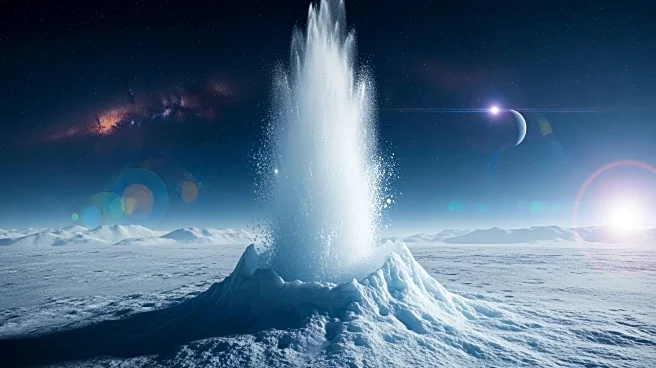What's Happening?
A recent study led by researchers from Oxford University, Southwest Research Institute, and the Planetary Science Institute has provided new insights into the heat flow of Saturn's moon Enceladus, suggesting it may host a stable subsurface ocean capable
of supporting life. The study found significant heat flow at Enceladus's north pole, overturning previous assumptions that heat loss was confined to its active south pole. This discovery strengthens the case for Enceladus as a potential habitat for life, as its global, salty subsurface ocean is believed to be one of the best places in the solar system for life to evolve outside Earth. The research, published in Science Advances, highlights the importance of understanding Enceladus's energy balance, maintained by tidal heating from Saturn's gravity.
Why It's Important?
The findings are crucial in the ongoing search for extraterrestrial life, as they suggest that Enceladus's ocean could remain liquid over geological timescales, providing a stable environment for life to potentially emerge. This research enhances our understanding of the moon's geophysical processes and its potential habitability, making it a key target for future space missions. The study also demonstrates the value of long-term data collection, as insights from NASA's Cassini spacecraft continue to reveal new aspects of Enceladus's environment years after the data was obtained. The implications extend to the broader field of astrobiology, offering a promising avenue for discovering life beyond Earth.
What's Next?
Future research will focus on determining the age of Enceladus's ocean to assess its potential for supporting life. Missions planning to explore Enceladus may utilize robotic landers or submersibles to probe its ocean, guided by the study's findings on ice shell thickness. The continued exploration of Enceladus could provide valuable information on the conditions necessary for life to develop, influencing the design and objectives of upcoming space missions. As scientists refine their understanding of Enceladus's environment, the moon may become a focal point for international collaboration in the quest to find life beyond Earth.
Beyond the Headlines
The study underscores the importance of interdisciplinary research in space exploration, combining geophysics, astrobiology, and planetary science to uncover the mysteries of distant worlds. It also highlights the potential for long-term missions to yield significant discoveries, emphasizing the need for sustained investment in space exploration. The findings may inspire new technologies and methodologies for studying other ocean worlds in our solar system, contributing to the broader understanding of planetary habitability and the conditions necessary for life.
















